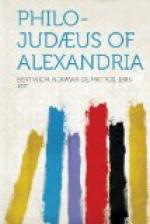of analysis or systematic connection of ideas.”
Philo’s philosophical conceptions lie scattered
up and down his writings, “strung on the thread
of the Bible narrative which determines the sequence
of his thoughts.” Nevertheless, though
he has not given us explicit treatises on cosmology,
metaphysics, ethics, psychology, etc., and though
he was incapable of close logical thinking, he has
treated all these subjects suggestively and originally
in the course of his commentary, and his readers may
gather together what he has dispersed, and find a
co-ordinated body of religious philosophy. However
loosely they are set forth in his treatises, his ideas
are closely connected in his mind. Herein he
differs from his Jewish predecessors, for the notion
of the old historians of the Alexandrian movement,
that there was a systematic Jewish philosophy before
Philo, does not appear to have been well-founded.
All that Aristeas and Aristobulus and the Apocryphal
authors had done was to assimilate certain philosophemes
to their religious ideas; they had not re-interpreted
the whole system of philosophy from a Jewish point
of view or traced an independent system, or an eclectic
doctrine in the Holy Scriptures. This was the
achievement of Philo. His thought is not original
in the sense of presenting a new scheme of philosophy,
but it is original in the sense of giving a fresh
interpretation to the philosophical ideas of his age
and environment. He ranges them under a new principle,
puts them in a new light, and combines them in a new
synthesis. This again is characteristic of the
Jewish mind. Intent on God, it does not endeavor
to make its own analysis of the universe by independent
reasoning, but it utilizes the systems of other nations
and endeavors to harmonize them with its religious
convictions. Hence it is that nearly all Jewish
philosophy appears to be eclectic; its writers have
ranged through the fields of thought of many schools
and culled flowers from each, which they bind together
into a crown for their religion. They do not,
with few exceptions, pursue philosophy with the purpose
of widening the borders of secular knowledge; but
rather in order to bring the light of reason to illuminate
and clarify faith, to harmonize Judaism with the general
culture of its environment, and to revivify belief
and ceremony with a new interpretation. All this
applies to our worthy, but at the same time he was
a philosopher at heart, because he believed that the
knowledge of God came by contemplation as well as
by practice, and, further, because he had a firm faith
in the universalism of Judaism; and he believed that
this universal religion must comprehend all that is
highest and truest in human thought. Like most
Jewish philosophers he is synthetic rather than analytic,
believing in intuition and distrusting the discursive
reason, careless of physical science and soaring into
religious metaphysics. Again, like most Jewish
philosophers, he is deductive, starting with a synthesis




